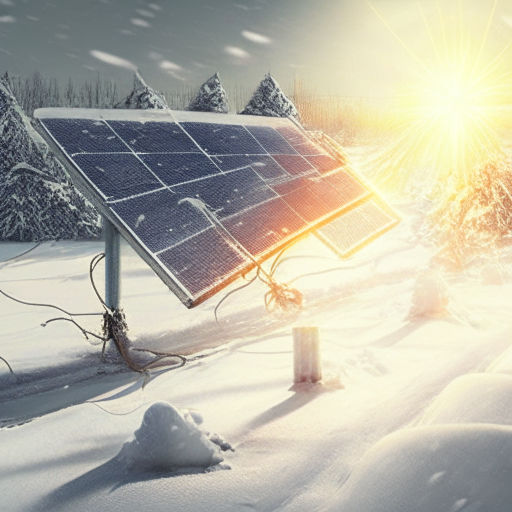Maximize Your Solar Energy Efficiency in Harsh Winter Conditions
As a dedicated survivalist, you understand the critical importance of achieving self-sufficiency, especially when faced with the challenges posed by extreme winter weather. A primary concern for many is the effective utilization of renewable energy sources during these frigid months. While the icy chill can seem like a formidable barrier, there's no need to worry! This article will delve into the remarkable potential of solar power in cold climates. We will uncover practical strategies that allow you to harness solar energy effectively, ensuring that you remain empowered and well-prepared, even in the harshest winter conditions, by adopting an informed and proactive approach.

It is a common misconception that solar electricity is only viable in warm, sunlit regions. However, thanks to groundbreaking advancements in technology, capturing solar energy in colder environments is not only feasible but increasingly efficient. Let’s explore the diverse techniques that empower solar power systems to adapt and thrive in extreme cold, and how you can utilize this sustainable, eco-friendly energy source to significantly enhance your lifestyle and survival strategies.
To maximize your solar energy capture, it is vital to understand that solar panels generate energy from sunlight, not warmth. Although colder temperatures can influence the efficiency of solar panels, they do not render them ineffective during winter months. By implementing thoughtful planning and innovative techniques, you can significantly enhance the performance of your solar power system, ensuring it operates effectively, even in the coldest conditions. Gaining a comprehensive understanding of how solar panels function across different temperature ranges will empower you to make informed decisions that effectively meet your energy needs.
A key factor in optimizing solar electricity in cold climates is the angle and orientation of your solar panels. Proper alignment can dramatically improve the amount of sunlight your panels receive throughout the day. In winter, the sun’s trajectory is lower in the sky, making it crucial to tilt your panels at a steeper angle. This adjustment maximizes sunlight capture, leading to improved efficiency. Additionally, orienting the panels towards the south can further enhance their sunlight collection capabilities, which is particularly advantageous during the shorter days of winter.
Snow accumulation poses another considerable challenge in colder regions, often obstructing the effectiveness of your solar panels. A thick blanket of snow can significantly diminish electricity output. However, by addressing this challenge proactively, you can implement effective solutions. Consider installing snow barriers or heating elements on your solar panels to prevent snow buildup. These enhancements not only facilitate the melting of existing snow but also ensure continuous energy production, even during snowstorms. Regularly clearing snow by hand is also a practical maintenance strategy to keep your panels functioning at peak performance and free from obstructions.
Integrating battery storage systems is a forward-thinking strategy to enhance solar power efficiency in cold conditions. These batteries store excess energy generated during daylight hours for use during periods when sunlight is limited or temperatures drop. The importance of battery storage becomes especially pronounced in freezing conditions, as it ensures a consistent supply of electricity when you need it most. By investing in a reliable battery system, you can maintain your energy independence and be prepared for any unexpected circumstances that may arise during severe winter weather.
Selecting the right type of solar panels is vital for optimizing your solar energy system’s efficiency in cold climates. Certain panels are specifically designed to perform better in lower temperatures and may incorporate advanced insulation or specialized materials that minimize the impact of frost and ice on their performance. By making an informed choice about the panel types that best suit your cold environment, you can significantly enhance energy production and ensure that your solar power system consistently meets your energy needs.
In addition to technical considerations, having your solar power system installed by professionals who are experienced in cold climate conditions is essential. Skilled installers can provide invaluable insights regarding best practices for installation, ongoing maintenance, and troubleshooting, which are crucial for optimizing your system. Their expertise will help ensure that your solar setup operates at peak efficiency, even under the most challenging winter conditions, ultimately boosting the reliability of your energy source.
Maintaining a proactive and prepared mindset is critical in survival scenarios. While solar power can serve as a dependable energy source in cold climates, having backup generators or alternative energy solutions is essential. These additional measures will act as a safety net during extended periods of low sunlight or unexpected system failures. By integrating solar power with other renewable energy sources, you can further enhance your energy independence and resilience, ensuring you are well-equipped to tackle any weather-related challenges.
Solar energy is not restricted to warm and sunny areas; it holds immense potential even in the coldest climates, provided it is strategically planned and technically advanced. By adjusting your panel angles, mitigating snow accumulation, incorporating battery storage, selecting suitable solar panels, relying on skilled installation, and having contingency plans, you can unlock the complete potential of solar energy in extreme cold. Embrace renewable energy with confidence and resourcefulness, securing your survival and sustainability in any climate.
The post Solar Energy in Extreme Cold: Unlocking Its Full Potential appeared first on Survival Bite.
The Article Solar Energy’s Full Potential in Extreme Cold Conditions Was Found On https://limitsofstrategy.com
Comments are closed